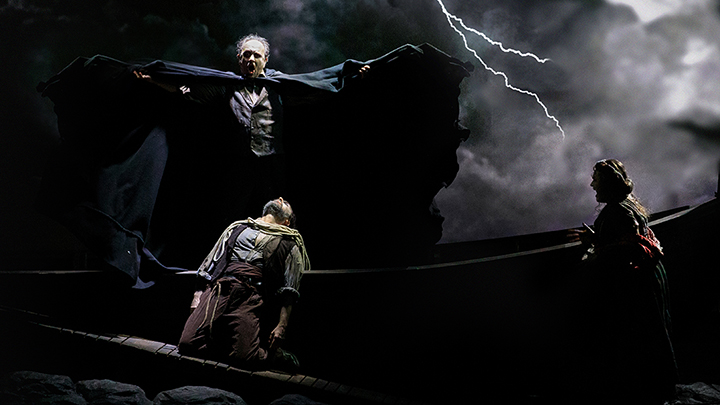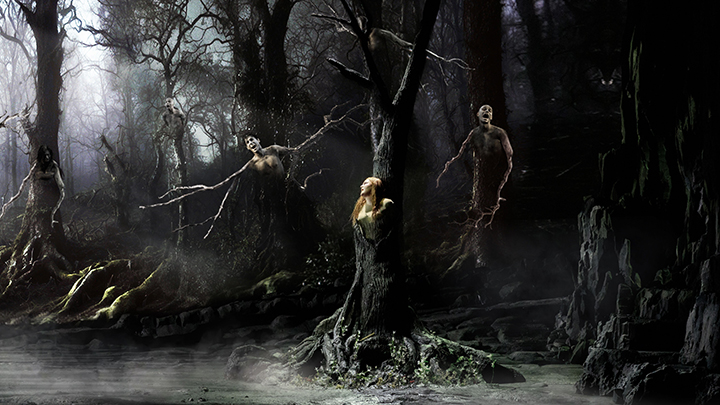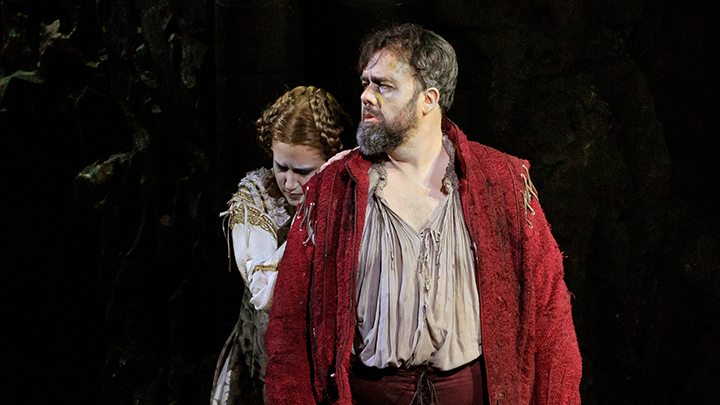The ignavi – those who refuse to take sides in debates – for example, are condemned to march forever behind a white flag. The lustful (where we meet Paolo and Francesca, from that other big early 20th century Dante opera), knocked around in an endless windstorm just as their passions carried them away in life (which would also explains the random New Rochelle dustbowl scene in Luca Guadagnino’s wretched Challengers). So, sitting at Bologna’s Comunale Nouveau (the provisional theater in the city’s convention center area while the main theater, due to reopen in 2026, undergoes repairs) on Friday for Pier Francesco Maestrini’s Dantesque, agenda-driven Il trittico, I was wondering what I might have done to have to assist to such a bland, wayward production – or what punishment I might eventually incur for writing about it!
Like some scholars, Maestrini sees Trittico’s three parts as equating to Dante’s three canticles – the ceaseless infernal torment of Tabarro, Angelica’s Purgatory of perpetual anticipation in Suor Angelica, and Gianni Schicchi’s hard-earned laugh as Paradise (despite the fact that Gianni Schicchi, the only character of Dante’s devising in Trittico, is gnawing on necks in Inferno Canto XXX). He accordingly pumps the three operas full of visual references to both the Divina Commedia and Gustave Doré’s famous illustrations of it, without much coherence, often saying little about the operas’ distinct dramaturgies.
Tabarro makes it out the least scathed of the three; though construing the barge captain Michele as a Charon figure, schlepping dead souls across the river Styx, doesn’t make much sense, and the video supplements of the hellish hauling stevedores looked like Lord of the Rings (a cultural property with which Italy has a very specific relationship), Maestrini at least grasps the opera’s abundance of surface misery. How Luigi is able to die in hell, however, remains beyond my understanding.
But Suor Angelica, unfolding on ostensibly the beach of Purgatorio I, was much, much lumpier. While the opera’s lopsided doctrine of expiation lends itself to a Purgatory-inspired take, at the end, Angelica, who takes poison after learning about the death of her son, is ratcheted back to Inferno XIII where the souls of those who die by suicide are turned into trees. The scene was less reminiscent of Dante, whose trees are not anthropomorphic, but a mix of Otto Schenck’s Rusalka and the forest from The Wizard of Oz. As Angelica raised her limp arms towards some generic source of light and died, I imagine dry eyes abounded.
Schicchi, whose comedy is ceaseless but unsubtle, came off the least effectually. Librettist Giovacchino Forzano flexed some finely tuned Tuscan literary chops in coaxing belly laughs out of the disquieting Inferno scene about a falsified will, but Maestrini is more interested in sight gags like Buoso’s greedy relatives plod around in gilded, leaden robes à la Inferno XXII, the cheerful, Monty Python-esque friars, and the starlings swarming around Rinuccio and Lauretta (once again, an Inferno V callback). The production’s final image is of a playful demon farting.
But rather than an arc, a progression towards something, the staging was instead just a circuitous grab bag tied together by the exaggerated and grim sets, costumes, and lighting of Nicolas Boni, Stefania Scaraggi, and Daniele Naldi, respectively, and the complex video backdrops that set the scenes. A friend of mine loves to quote how a Dante scholar once told her that to become an expert in the sommo poeta, it requires “20 years sitting on your ass” – this production, while not yielding any similar intellectual fruit, affords a comparable physical sensation.
The singers still managed to break through and make individual impressions; Franco Vassallo was a high tragedy Michele, his concise and acidic baritone snarling out the lines with vehemence, though he also has a real flare for shaping his sound across a phrase with specificity and largesse. And he certainly seemed like the more appealing option when considered beside the declamatory, decibel-rich Luigi of Roberto Aronica who merely sounded parched.
In between them was the very fine Chiara Isotton. As the miserable wife Giorgetta caught up in an affair with one of her husband’s stevedores, she’s no tart and probably couldn’t be a convincing harridan even if she wanted to be. But she turns her bronze timbre towards nostalgic longing and is a thoughtful colorist with throbbing, if somewhat disconnected, high notes. Steadiness has to be the babyfaced Isotton’s most laudable quality – in taxing, heavy music, she sounded robust and unfatigued and you never worry if she’ll be able to make it to the end of the phrase.
But despite her merits, Suor Angelica, which lays squarely in the sweet spot of her voice, was missing a frenzy and desperation beyond its outward somberness. A sincere but earthbound “Senza mamma” confirmed that Isotton is a solid artist, but certainly not a heartbreaker. And she was fairly easily beaten into submission (by way of a masked, shadowy body double) by the imposing Zia Principessa of Chiara Mogini whose mezzo has a Simionato-like edge without a Simionato-like heft.
Progressing to Schicchi, enough good things can’t be said about the Lauretta of Darija Augustan. Though the character has precious little to do, her “O mio babbino caro,” drawn in long, easy phrases with a ductile, shimmery soprano was the highlight of the evening and the only moment in any of the three operas to garner mid-performance applause. Giorgio Misseri was fine and ardent as Rinuccio, unfolding his aria with a sense of occasion that hardly befit the otherwise squalidness of the stage picture, though his B-flat looked much harder than it sounded.
Roberto de Candia acted gamely, fulfilling perhaps the most important criteria for any Gianni Schicchi, and seemed to be having quite a good time. He needs a reminder, though, that words can, in fact, be put over with legato to just as much effect as barking them. Indeed, there were some really lovely brief legato moments, like when the Doctor comes to check on the then-deceased Buoso, but I wish he didn’t just treat it as a comic device.
In some of the smaller roles, Vittoriana De Amicis was a lovely Suor Genovieffa and Marco Puggioni made the most of his scene in Tabarro as the song seller. Manuela Custer, De Amicis again, and Laura Cherici tossed off a lovely trio in Schicchi even if all of the voices were not of the same calibre. Cristina Melis, as Frugola, was hooty.
Roberto Abbado, conducting this score for the first time in one evening, often struggled to keep the orchestra from overwhelming the singers amidst the somewhat clangy acoustic of the Comunale’s temporary space. His reliance on drawing contrast from the quicksilver shifts of mood in the score made for interesting listening in Tabarro, but it had become predictable by the time Schicchi rolled around.
But despite its longueurs, I was glad to get in a Trittico during this Puccini centennial year. And as for the production, which will travel next to Trieste, I can only quote Churchill: “If you’re going through hell, keep going”
Photos: Andrea Ranzi






